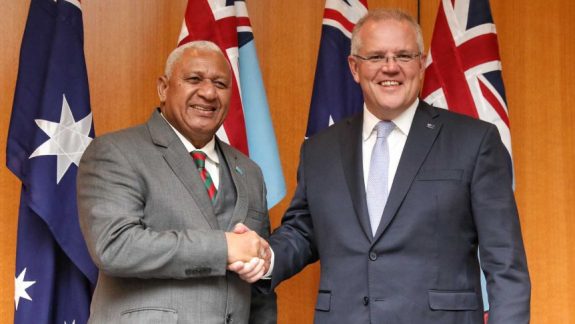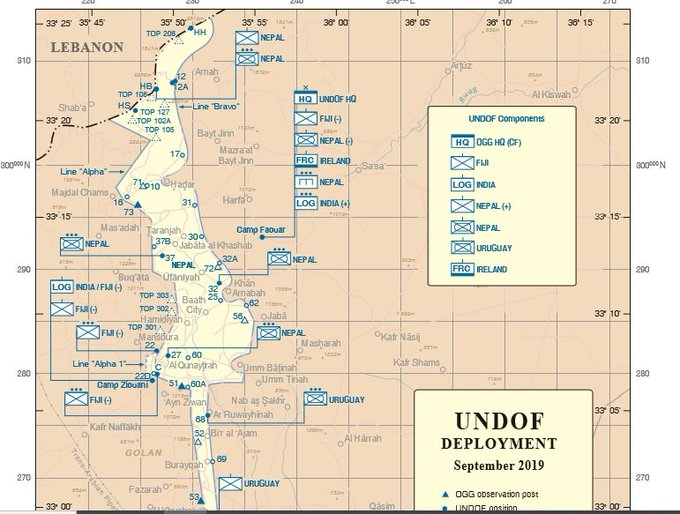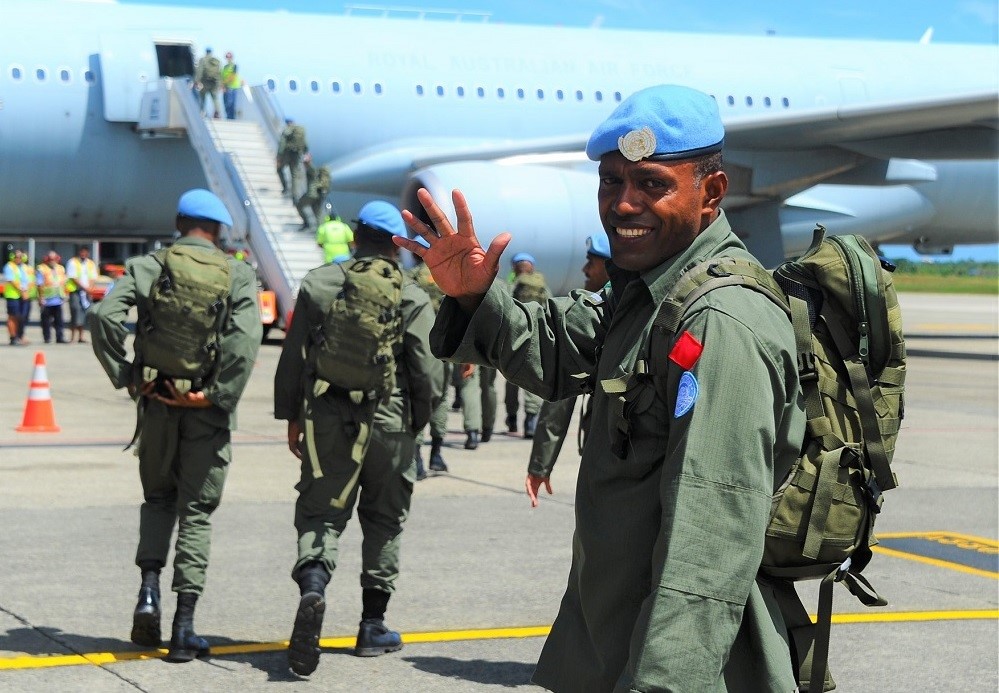Golan Heights – Questions on Australia’s role still unanswered

By Hungry Charley
Prime Minister Scott Morrison’s recent statement on a new role for Australian peacekeepers in the Golan Heights, where they would join an existing Fijian force already deployed by the UN was painted largely as boosting Australian – Fijian relations by the Government, while the scope of the Australian mission is still unclear.
The Prime Minister stated that Australians would be part of the United Nations Disengagement Observer Force (UNDOF) in the Golan Heights which has been operating since 1974 following escalation of Israeli-Syrian hostilities.
He indicated that Australian troops would be sent to ‘train and support’ the Fijian contingent deployed to Syria. The Fijians (194 in number) are already present in the Golan Heights, contributing significant numbers of peacekeepers since its first deployment in 2013.
Fiji has maintained its commitment in the Golan Heights despite around 50 deaths in the UNDOF over its mission history and an incident in which 45 Fijian peacekeepers were held hostage by militia in 2014.
UN documents released in September show the current positions of forces within the UNDOF deployment, including Fijian forces.

The announcement by the Prime Minister was given within the context of the Fiji–Australia Vuvale Partnership, signed by Morrison and Fijian Prime Minister Frank Bainimarama in September this year and the increasing interest in joint military cooperation since the announcement of Australia’s role in redeveloping the Black Rock training facility in Nandi.

Fijians embarking for Golan Heights mission (image from aspistrategist.org.au)
But despite the statements made by the Prime Minister, the size of the Australian force and its function remains unclear. There have been no media statements on this deployment by the United Nations Peacekeeping Force or any other information available from UN Information sources in Australia, despite being contacted a week ago. Similarly, there is no information forthcoming from the Australian Defence Force on the scope of the engagement, which itself is unusual, peacekeeping forces are not meant to be secret, the success of operations depends to a large extent on a high profile being maintained. Assertions that the increased Australian role will be supportive is also evidenced by the presence of an ADF officer who has been deployed since March this year with the UNDOF, presumably as an advisor, but again this is an assumption.
While deploying peacekeeping missions provides nations credit as being good international actors, the timing of the Australian participation is not consistent with Morrison’s critique of the UN in his speech earlier this month at the Lowy Institute and comments regarding ‘negative globalism’ he has recently given. Australia has been winding back its peacekeeping commitments over the years of the Coalition Government and in this sense, the mission announcement came as somewhat of a surprise.
Also, the Prime Minister’s words regarding the suitability of the mission due to a low level of risk to Australian forces does not reflect what has been happening on the ground over the last year. A UNDOF report from September this year shows that UN forces have been witness to substantial military actions between combatant forces, on both the Syrian and Israeli sides, as reported in the UNDOF September 2019 report:
“I am particularly concerned about the firing on 12 June of missiles across the ceasefire line by the Israel Defense Forces. Furthermore, I remain concerned by the continued presence of the Syrian armed forces in the area of separation. There should be no military forces in the area of separation other than those of UNDOF. The Israel Defense Forces should refrain from firing across the ceasefire line and crossing the ceasefire line. The continued presence of unauthorized weapons and equipment in the area of limitation on both the Alpha and Bravo sides is also of concern. These developments have the potential to jeopardize the Agreement.”
The area of ‘limitation’ is the area where military actions are forbidden under the UN mandate, though currently the UN only has access to 50% of the area of this area, according to the UN report. In fact the political situation in the Golan sites is much more unstable than it was a year ago, thanks in large part by Israel’s action to annex the Golan Heights in 1981 and ongoing Israeli occupation that was ratified by Trump in March this year. This is despite the area being claimed by the Syrian Government due to its location in relation to the 1967 truce line. So Israeli occupiers are technically in breach of UN resolutions on this matter.
The UN responded by declaring in March that its mission would not hindered by these political developments and that, “A majority of Security Council members on Wednesday stressed the importance of upholding international law regarding the occupied Golan , in the face of the unilateral move by the United States to recognize Israel’s sovereignty over them.” But according to UN reports Israeli forces have also been erecting barriers to movement in area of the ‘Qunaytirah crossing’, subjecting UN personnel to security checks and restricting access to the areas of ‘separation’ and ‘limitation’ in the north of the zone.
What is the Israeli/US interest in the Golans that has prompted Israeli occupation and such strong support from the US (and Australia) in violation of UN resolutions? The answer is partly settlement opportunities for Israel, but the other is oil. According to the Israeli operated Afek Oil and Gas there is ‘billions of barrels of Israeli oil’ under the ground. Except it is Syrian ground.
As reported in the Jerusalem Post, Afek has a permit to explore for conventional oil at up to 10 sites in a 39,500-hectare zone south of Katzrin (Qatsrin). This area lies within the Israeli area of control to the west of the de-militarised zone administered by UNDOF. The other key point here is that Afek is a wholly owned subsidiary of Genie Energy, a company with some by some powerful people on their strategic advisory board, Rupert Murdoch, Jacob Rothschild, former CIA Director James Woolsey and former Bush Secretary of State, Dick Cheney. Genie in turn is part of the larger parent company and many of the same owners IDT Corporation, an American tele-communications company and in their words, “… IDT’s Wholesale Carrier Services business is the largest independent carrier of voice traffic globally.”
Step in Newark lawyer and Genie Energy Acting President, Ira Greenstein. Greenstein was an official in the presidential transition team member for the incoming Trump administration. Trump’s son-in-law, Jared Kushner was also a member of this team and later became Trump’s “Middle East Envoy’. Greenstein was still Genie Energy’s acting President and according to the Millenium Report published in April this year, a breach of the conflict of interest rules for government employees in the US. Nonetheless Greenstein’s position on the transition team meant he had influence on government and UN appointments for the emerging Trump Administration and seems to have had influence over military actions Trump took against the Syrians following his election.
To give you an idea on the power of this conglomerate, Ira Greenstein has several corporate connections with Jared Kushner as well as within the pro-settlement organisation in Israel, Mosaic United, being the President and Treasurer of American Friends of Mosaic United in the US. Both Greenstein and Kushner have been involved with Israeli development of illegally settled areas on the West Bank, it seems now the Golan Heights is the next settlement front. Genie Energy is populated by strong pro-Israeli nationalists, such as the current President of Genie Oil And Gas, another subsidiary of Genie Energy, Efraim Eitam, who seems to be the one spearheading exploitation of resources in the Golan Heights and has strong relationships the within Israeli administration. He was a Brigadier General in the Israeli Defence Forces (IDF) Reserves and has previously called all Arabs in Israel a “cancer.”

Jared and Rupert – good friends
Rupert Murdoch is another key Genie Energy connection to the Trump administration, sharing a long-time and close friendship with Kushner and his wife Ivanka Trump, as well as seemingly gaslighting Trump’s military actions against Syria. In fact Murdoch is on the record saying that Genie would help spur a “global, geopolitical paradigm shift.”
Genie Energy suspended exploratory drilling just prior to President Donald Trump’s recognition of Jerusalem as the capital of Israel in March. As UN reports show there has been an increase in Israeli military activity in the Golan Heights perimeter, particularly after an Iranian drone allegedly entered “Israeli airspace.” Trump has also been to the Golan himself raising feelings of Israeli nationalism amongst settlers and politicians alike, declaring a new “Trump Heights’ settlement along with Prime Minister Benjamin Netanyahu, all contrary to UN resolutions.
Given the tensions in the Golan Heights, Scott Morrison’s claims of the peacekeeping deployment being a low risk operation seems to be playing down the risks. In fact, given the recent politicking, it seems it has the potential to be a powder keg waiting to go off. A belligerent Israel with US support and an agitated Assad in Syria with increasing levels of Russian involvement due to Turkey’s recent intervention, do not add up to a stable situation for this part of the world.
Another key matter of interest is Morrison’s relationship with Trump and the Israeli administration, helped here in no short measure by ex-ambassador David Sharma. Morrison’s stance on Israel has generally been to follow the US position, herein lies the tension with the UN mission and why questions regarding our future involvement in the UNDOF need to be clarified.
It’s a shame Australia couldn’t show the same commitment to ensure the safety of Australian children and their mothers in northern Syria, not a priority it seems, but according to Morrison, neither is the peacekeeping mission.
Like what we do at The AIMN?
You’ll like it even more knowing that your donation will help us to keep up the good fight.
Chuck in a few bucks and see just how far it goes!









